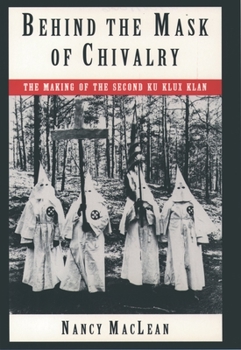Behind the Mask of Chivalry: The Making of the Second Ku Klux Klan
Select Format
Select Condition 
Book Overview
On Thanksgiving night, 1915, a small band of hooded men gathered atop Stone Mountain, an imposing granite butte just outside Atlanta. With a flag fluttering in the wind beside them, a Bible open to the twelfth chapter of Romans, and a flaming cross to light the night sky above, William Joseph Simmons and his disciples proclaimed themselves the new Knights of the Ku Klux Klan, named for the infamous secret order in which many of their fathers had served...
Format:Paperback
Language:English
ISBN:0195098366
ISBN13:9780195098365
Release Date:July 1995
Publisher:Oxford University Press, USA
Length:336 Pages
Weight:0.92 lbs.
Dimensions:0.8" x 5.5" x 8.5"
Customer Reviews
2 ratings
Shocking
Published by Thriftbooks.com User , 14 years ago
This book will alter your view of who the Klan was and how its presence in the United States dramatically impacted the 1920's and 1930's. Most interesting is MacLean's analysis and comparison of the Klan in the U.S. with fascists in Italy and Germany. Seeing the Klan as part of an international/transatlantic phenomenon is particularly intriguing. I live about thirty miles from Athens, Ga., and as a local history, BTMoS impressed me greatly.
Reactionarism and the Ku Klux Klan
Published by Thriftbooks.com User , 23 years ago
Utilizing the mind frame of Paul Fussell and his contemporaries that the Great War catalyzed the transformation of European and the western world from traditional to modernity. Nancy McLean advances the paradigm that a countermovement to resist the new values and norms such feminism, corporatism, unionism, and globalization. This movement developed under the auspices of the Ku Klux Klan, which contained motifs of populism, emphasis of race, gender, and age (biological) antagonisms over class and national sovereignty. The fervor populism sponsored by the conservative forces in Athens, Georgia was similar in context to the fascist organizations that occurred in Italy and Germany in an attempt to turn back the clock on ethic morals. Yet unlike its German or Italian counterparts failed to firmly take root in politics due to the brevity of the depression and boom. These characteristics manifested themselves into morality crusades to reinforce traditional norms over modern ones, but moreover the patriarchal, social, hierarchy. These inspired the reinforcement of the prohibition of liquor consumption; reconstitute the obedience to one's parents. It caused a heightened proliferation of spying and becoming turncoats on one's neighbors. Along with other fascist organizations held contradictory beliefs suggesting the development of chain stores and national/international companies were exclaimed as instruments of Catholics and Jews to dominate the U.S. economy, and yet were Bolsheviks. To exterminate this external threat from abroad, citizens joined together to boycott these conglomerates and support locally owned shops. The Klan projected powerful images of Black men raping white women in an attempt to outrage their targeted constituents to gain members and consolidate man's power over their subordinates namely women. The other catalyst regarding this movement regarded the economic depression that occurred in 1924 thus sparked a growing animosity towards people's perceived class enemies-Catholics, Jews, and Eastern European immigrants. Which had largely been absent during one of the largest immigration period in 1880. The primary purpose was to insure the independence and propriety of the middle class. Thus attempted to prevent any further declining down the socio-economic status ladder from the upper class and utilize force when necessary when workers movements occurred in threatening their livelihood




